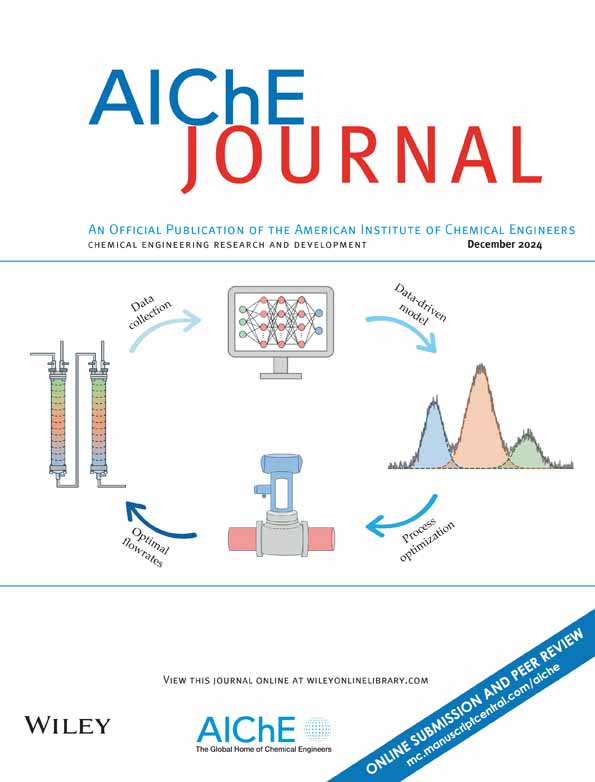Probing bimodal sub-nanopores in carbon for ideal fast sieving separation of propylene/propane
IF 4
3区 工程技术
Q2 ENGINEERING, CHEMICAL
引用次数: 0
Abstract
Rigid molecular sieve is highly desirable in industrial gas separation, but persistently challenged by sluggish adsorption within inherent rigidity-confined narrow sieving pores. Herein, we report a rigid carbon-based molecular sieve featuring ink-bottle bimodal sub-nanopores for the ideal fast sieving separation of propylene/propane mixture. The tailor-made narrow pore entrance, centered at 5.0 Å, affords precise sieving capacity for propylene over propane with a high selectivity exceeding 200. Concurrently, the larger cavity located at 6.4 Å allows the exceptional fast adsorption kinetics of propylene. The measured diffusion coefficient of propylene (4.2 × 10–3 s−1) is one to two orders of magnitude higher than state-of-the-art rigid molecular sieves and comparable to the non-steric diffusion observed in mesoporous zeolite. High-purity C3H6 production (>99.2%) is achieved in breakthrough experiments through a single adsorption–desorption cycle. This study paves an avenue to unlock rigid molecular sieves toward advanced separation of challenging gas analogues.探测碳中双峰亚纳米孔对丙烯/丙烷理想快速筛分的影响
刚性分子筛在工业气体分离中是非常理想的,但在固有的刚性限制的窄筛孔内吸附缓慢一直受到挑战。本文报道了一种具有墨水瓶双峰亚纳米孔的刚性碳基分子筛,用于丙烯/丙烷混合物的理想快速筛分。特制的窄孔入口,以5.0 Å为中心,为丙烯和丙烷提供精确的筛选能力,选择性超过200。同时,位于6.4 Å的较大空腔允许丙烯的特殊快速吸附动力学。测量到的丙烯扩散系数(4.2 × 10-3 s−1)比最先进的刚性分子筛高一到两个数量级,与在介孔沸石中观察到的非立体扩散相当。通过一次吸附-解吸循环,在突破性实验中获得了高纯度的C3H6 (>99.2%)。这项研究为解锁刚性分子筛以实现具有挑战性的气体类似物的高级分离铺平了道路。
本文章由计算机程序翻译,如有差异,请以英文原文为准。
求助全文
约1分钟内获得全文
求助全文
来源期刊

AIChE Journal
工程技术-工程:化工
CiteScore
7.10
自引率
10.80%
发文量
411
审稿时长
3.6 months
期刊介绍:
The AIChE Journal is the premier research monthly in chemical engineering and related fields. This peer-reviewed and broad-based journal reports on the most important and latest technological advances in core areas of chemical engineering as well as in other relevant engineering disciplines. To keep abreast with the progressive outlook of the profession, the Journal has been expanding the scope of its editorial contents to include such fast developing areas as biotechnology, electrochemical engineering, and environmental engineering.
The AIChE Journal is indeed the global communications vehicle for the world-renowned researchers to exchange top-notch research findings with one another. Subscribing to the AIChE Journal is like having immediate access to nine topical journals in the field.
Articles are categorized according to the following topical areas:
Biomolecular Engineering, Bioengineering, Biochemicals, Biofuels, and Food
Inorganic Materials: Synthesis and Processing
Particle Technology and Fluidization
Process Systems Engineering
Reaction Engineering, Kinetics and Catalysis
Separations: Materials, Devices and Processes
Soft Materials: Synthesis, Processing and Products
Thermodynamics and Molecular-Scale Phenomena
Transport Phenomena and Fluid Mechanics.
 求助内容:
求助内容: 应助结果提醒方式:
应助结果提醒方式:


